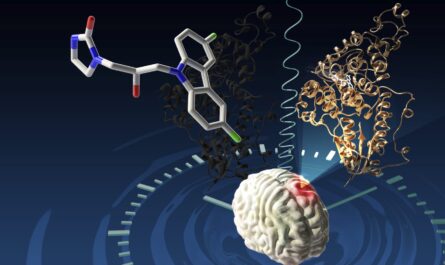A recent breakthrough in malaria research has unveiled a protein, named PfAP2-P, that plays a crucial role in the growth and immune evasion tactics of the malaria parasite. This discovery could potentially lead to the development of novel therapeutics and vaccines to combat the deadly infection.
The protein PfAP2-P was initially identified in a study led by KAUST (King Abdullah University of Science and Technology), which focused on malarial genes and proteins with rhythmic 24-hour expression patterns. This adaptation enables the parasite to synchronize its activities with those of the host during the human blood stage of its development cycle.
The levels of PfAP2-P were found to peak approximately 16 hours after red blood cell invasion, and then again around 24 hours later. These peaks coincide with the activation of genes associated with two essential biological processes: the parasite’s immune evasion strategy and its transition from one red blood cell to another.
This observation intrigued the researchers, who aimed to uncover the true function of PfAP2-P. Through a series of molecular experiments, they confirmed that PfAP2-P serves as a critical regulator of various key biological processes in the parasite. It acts as a repressor of genes involved in immune evasion and as a brake on genes related to the parasite’s sexual stage of development.
Moreover, the researchers identified several new proteins that are directly or indirectly controlled by PfAP2-P, some of which could be potential targets for future drug development. They also discovered that PfAP2-P activates the proteins necessary for the parasite to exit infected red blood cells and invade new ones.
The most promising revelation came from studying mutant malaria parasites that lacked a functional version of PfAP2-P. These parasites were unable to control the coordinated expression of sticky surface proteins on infected red blood cells, which are responsible for evading immune detection. As a result, the mutant parasites were readily recognized by malaria-destroying antibodies, offering a potential strategy for training the body to fight off natural malaria infections.
The researchers at KAUST are currently exploring the potential of these mutant parasites as immune triggers for vaccine development against malaria. This innovative approach could pave the way for more effective interventions in preventing and treating this deadly disease.
With this groundbreaking discovery, the fight against malaria has gained a potential advantage. By targeting PfAP2-P and the proteins it regulates, researchers may be able to develop new antimalarial interventions, including vaccines and therapeutics, that disrupt the parasite’s immune evasion tactics and prevent its growth within red blood cells.
Malaria remains a major global health burden, particularly in sub-Saharan Africa, where it claims hundreds of thousands of lives each year. The development of effective preventive and treatment measures is crucial in the ongoing battle against this deadly infection. The discovery of PfAP2-P’s role in the malaria parasite’s lifecycle brings hope for new strategies to combat the disease and save countless lives worldwide.
Note:
- Source: Coherent Market Insights, Public sources, Desk research
- We have leveraged AI tools to mine information and compile it



